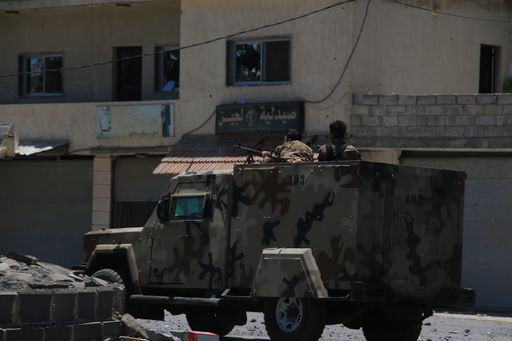Israel launched a series of air strikes in Syria this week, claiming that they were meant to protect the Druze, an Arabic-speaking community spread across Syria, Lebanon, Israel and the Syrian territory of the Golan Heights that Tel Aviv has illegally occupied since 1967.
Israel bombed Syrian forces in Sweida, a Druze-majority area in Syria, vowing to protect the community amid clashes between Druze militias and Bedouin tribes. In the process, Israel killed more than 30 Syrians and injured nearly 100, prompting strong condemnation from all quarters.
“The idea that Israel wants to protect the Druze, or is genuinely concerned about their situation in Syria, is not realistic,” Tuba Yildiz, an academic and analyst of Middle Eastern politics, tells TRT World.
Israeli attacks in Druze-dominated Sweida and Daraa areas in Syria are part of Tel Aviv’s attempt to establish a buffer zone in southern Syria, she says.
The attacks should be viewed in the context of Israel’s similar plan to depopulate southern Lebanon, where Tel Aviv is illegally occupying five areas, allegedly to keep hostile forces at bay.
“As a community, the Druze tend to experience identity crises and existential anxiety when a fragile state structure emerges,” Yildiz says.
She adds that the inability of the newly-formed Syrian government’s military structure to fully secure control is strengthening the hand of Hikmat al-Hijri, a double-dealing Druze leader in Sweida who went from being a religious figure associated with Iran’s Axis of Resistance to saying “Israel is not the enemy”.
The overwhelming majority of Druze spiritual leaders in Syria have publicly rejected integration with Israel.
Early this year, a large number of Druze protesters gathered in Seyouf Square in Jaramana, a suburb of Damascus, to denounce Israeli Prime Minister Benjamin Netanyahu’s statement warning the newly-formed Syrian army against advancing south of Damascus.
According to Omer Ozkizilcik, a research fellow at the Atlantic Council, Israel is claiming to protect the Druze community from a threat that does not exist.

A long history of discrimination
Israel’s ostentatious concern for the well-being of the Syrian Druze contradicts the long history of discrimination that members of the same community have faced in the occupied Golan Heights.
The Druze constitute about half of the 50,000 people living in the Syrian territory occupied by Tel Aviv, while the other half are Israeli settlers. The Druze make up 1.6 percent of Israel’s population and follow a distinct faith considered an offshoot of Shia Islam.
Druze leader Saeed Nafaa, who previously served as an Israeli Druze parliament member, says Israel is using his community “as a pawn to redraw the map” of the Middle East and “take more land for itself”.
While the Druze living in Israel are often cited as a relatively integrated minority, their poor living conditions tell a different story. Most Golan Druze identify as Syrian and have historically resisted Israeli citizenship, with many holding permanent resident status instead.
This rejection stems from a belief that the Golan is rightfully Syrian, expectations of its eventual return to Syria, and reluctance to serve in the Israeli military. Critics argue that Israel’s policies have aimed to assimilate the Druze into Israeli society while suppressing their Syrian identity.
The establishment of a demilitarised zone and restrictions on travel between the occupied Golan Heights and Syria have split families, with many unable to visit relatives across the border.
The ‘Yelling Hill’ near Majdal Shams has become a symbolic site where separated families shout messages to each other. Druze brides crossing into Syria to marry face permanent separation from their families in the Golan, as they are often unable to return.
The 2018 municipal elections in the occupied Golan Heights were controversial, with Druze religious leaders calling for a boycott, fearing it would signal acceptance of Israeli rule.
The 2018 Jewish Nation-State Law, which defined Israel as the nation-state of the Jewish people, was widely criticised by Druze in both Israel and the Golan for marginalising minorities.
Golan Heights Druze, alongside Israeli Druze, protested in Tel Aviv, arguing the law relegated them to second-class status by prioritising Jewish identity and downgrading Arabic’s official status.
Using the Druze to control Syria
Yildiz says the Syrian Druze are aware that Israel wants to control Syria through them. This is the reason the Syrian Druze, with the exception of Al-Hijri and his group, do not want Israel’s so-called protection, she says.
“Regardless of the circumstances, the Druze remain a community loyal to Syrian and Arab identity,” Yildiz says.
For now, the Druze are responding to Israeli aggression rather “quietly”, given the significant losses the community has suffered in recent clashes.
“If the Syrian government manages to establish the necessary stability, the Druze may oppose Israel more vocally,” she says.



















